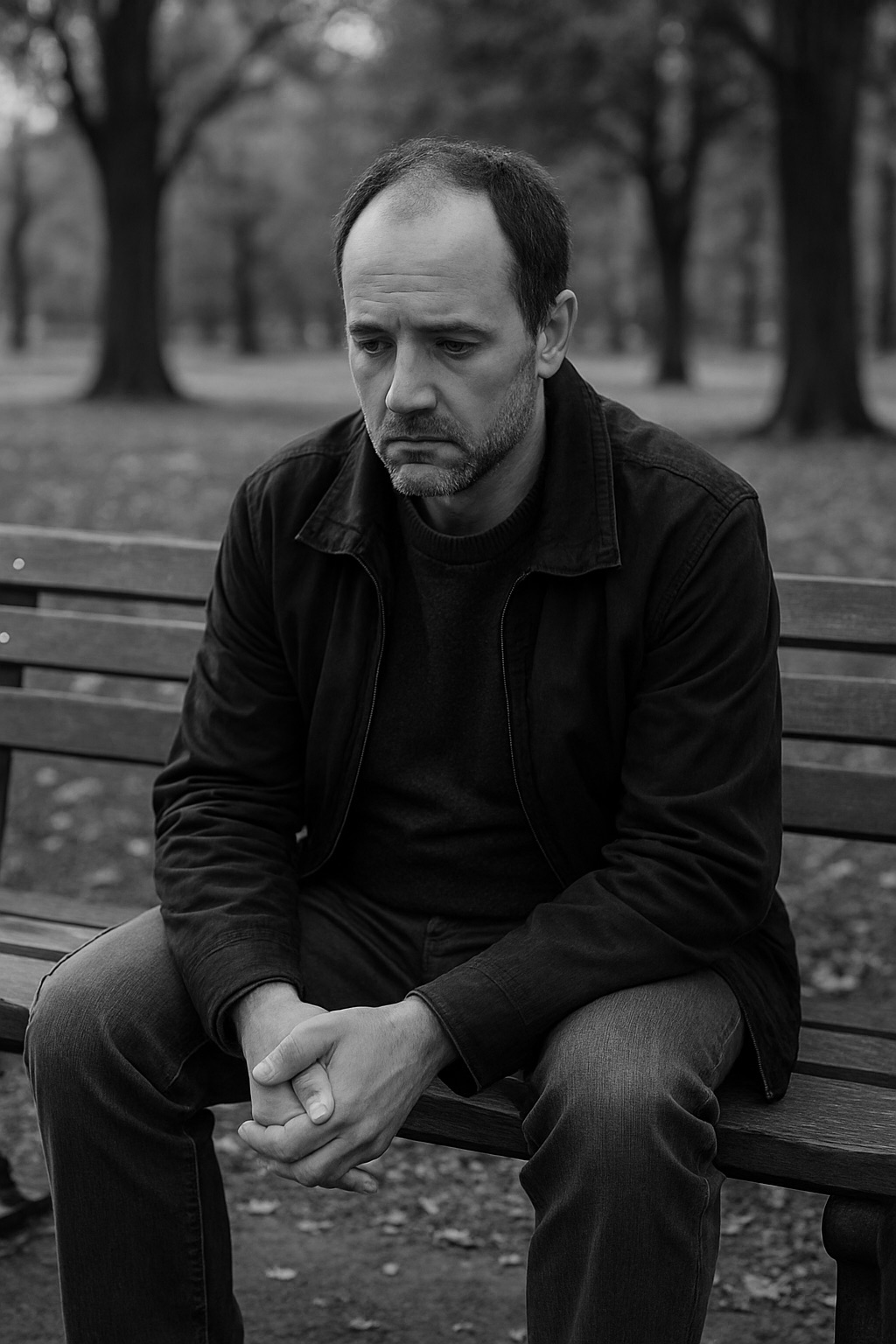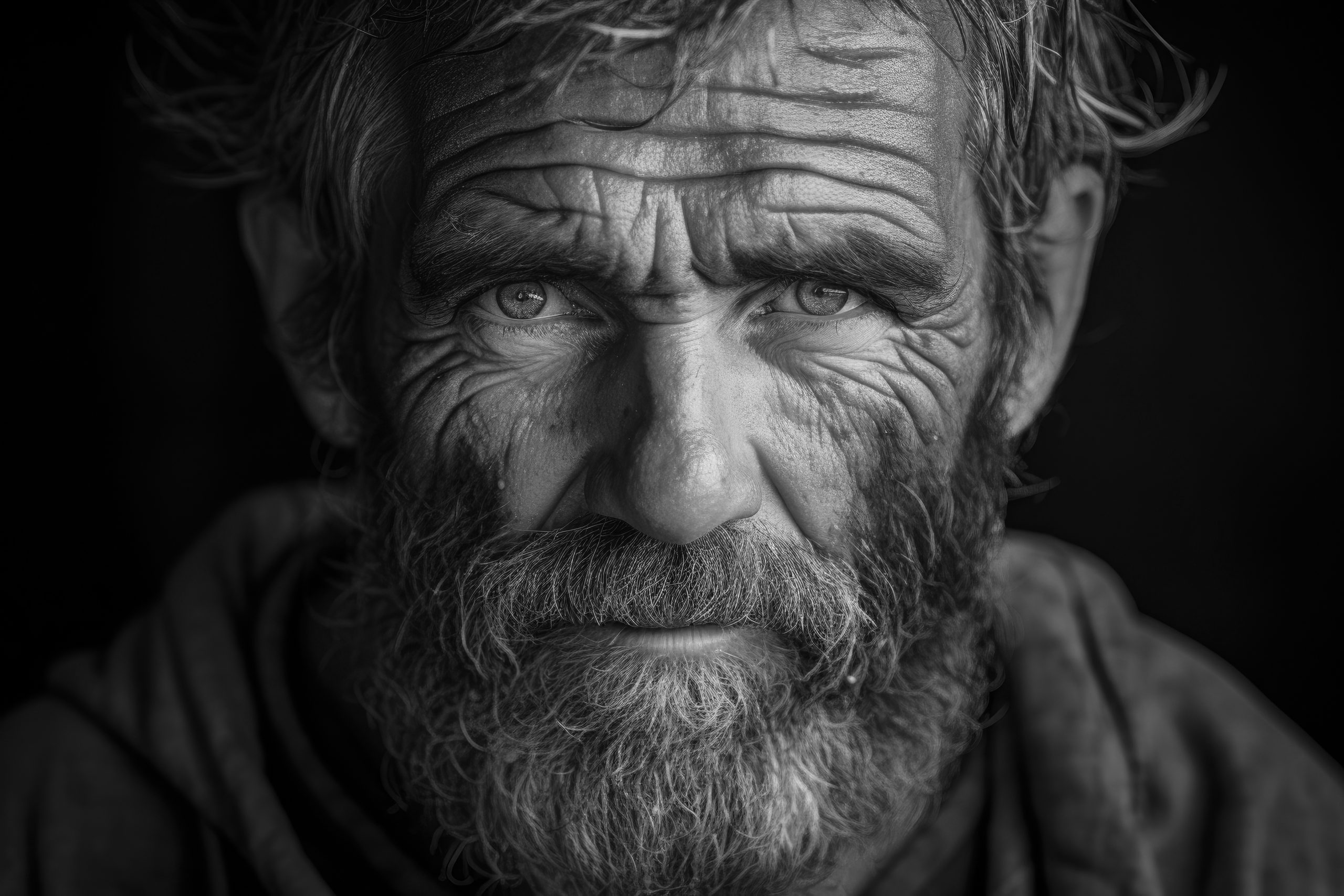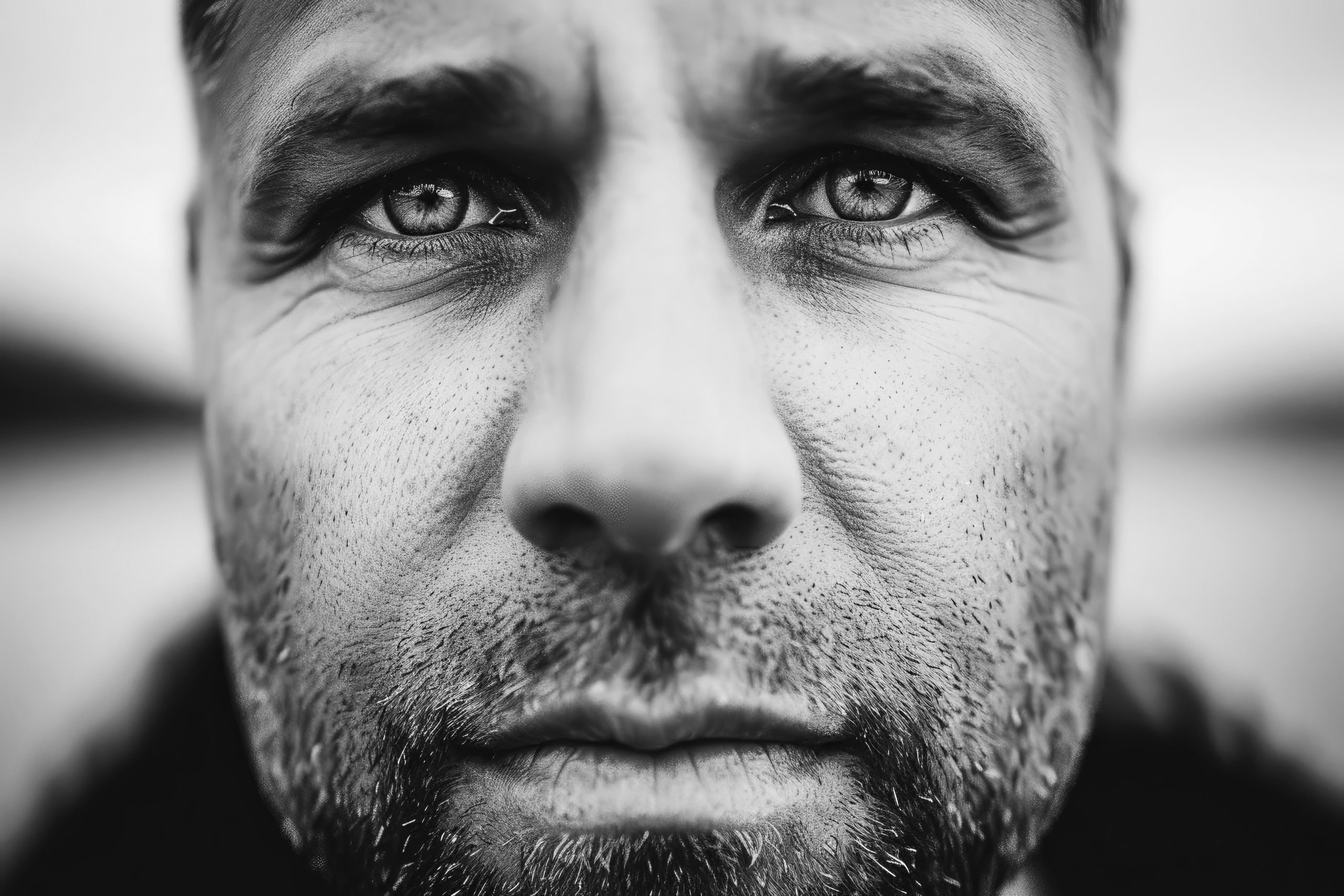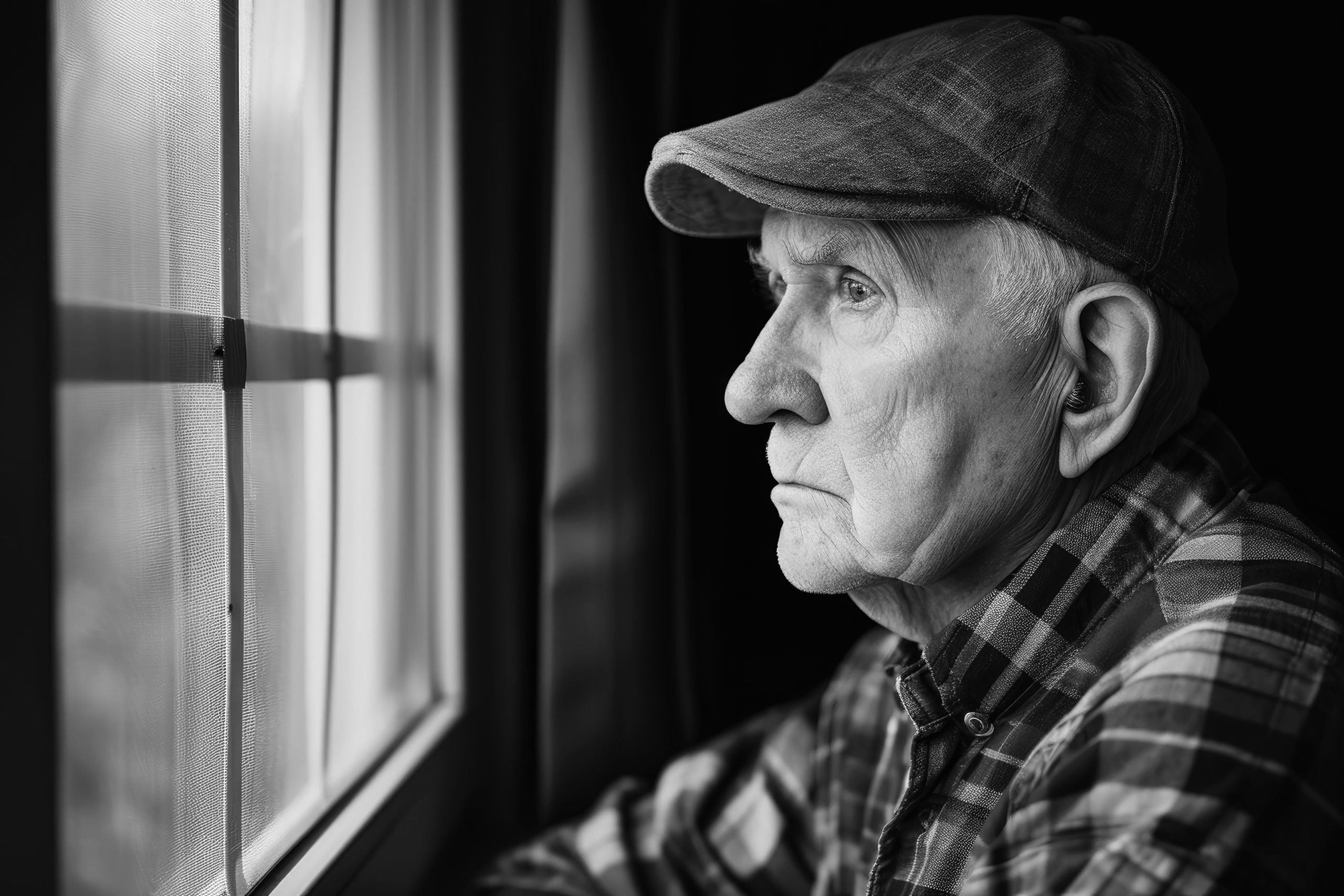Breaking the Silence: Understanding Male Loneliness and How Therapy Can Help
The Hidden Epidemic of Male Loneliness
Male loneliness is one of the most pressing but least talked about issues in modern society. Despite living in a hyper-connected age, where social media and instant communication are everywhere, millions of men in the UK feel deeply alone. In fact, research shows that 8 million UK men feel lonely at least once a week, and nearly 3 million say they feel lonely every single day.
Behind those numbers are silent struggles—men who appear “fine” on the surface but carry quiet battles within. Unlike women, who are often encouraged to maintain social bonds, many men find that their friendships thin out as they get older. Work, family obligations, and cultural expectations about masculinity all contribute to this decline.
Studies reveal that over one in four men report having no close friends at all. For some, this means they don’t have anyone to turn to during times of difficulty. Others rely solely on a partner or family member, which can place enormous strain on those relationships. The reality is stark: while loneliness affects everyone at times, for men it can become an entrenched and life-limiting condition.
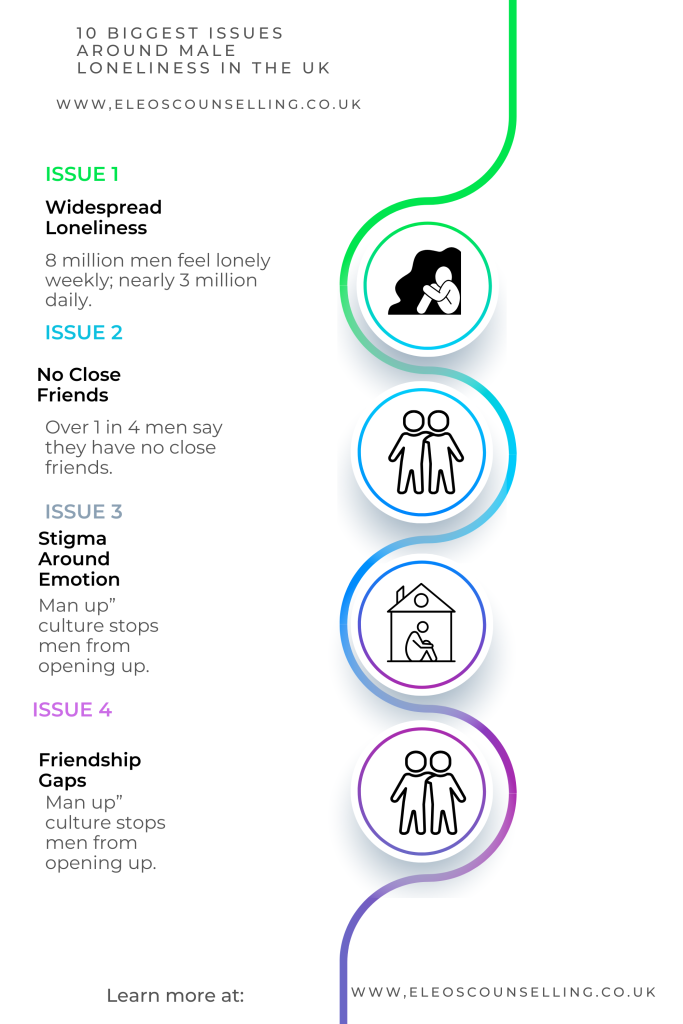
Why Male Loneliness Matters
Loneliness is not just a matter of feeling a bit isolated. It is closely tied to both mental and physical health. Research shows that chronic loneliness increases the risk of depression, anxiety, substance misuse, and even physical illnesses such as heart disease. Some studies suggest that prolonged loneliness can be as harmful to health as smoking 15 cigarettes a day.
For men, the risks are particularly severe. Men are statistically less likely to seek help for mental health problems, and suicide remains the leading cause of death for men under the age of 50 in the UK. When loneliness goes unaddressed, it can push men further into silence and despair, reinforcing a cycle of withdrawal.
The Stigma Around Male Loneliness
One of the biggest obstacles to addressing male loneliness is stigma. From an early age, boys are often taught to “man up,” “be strong,” or “not cry.” Emotional vulnerability is seen as weakness, and seeking help is sometimes viewed as failure. By the time they reach adulthood, many men have internalised the belief that admitting loneliness—or any emotional struggle—is shameful.
This stigma creates a double bind. Men may crave connection but feel unable to admit they need it. They may long for friendship but fear rejection or judgement. They may recognise their struggles but remain silent, convincing themselves that everyone else is coping just fine.
The result? Men often endure loneliness in silence. They might distract themselves with work, alcohol, or hobbies, but underneath, the longing for genuine connection remains unmet.
How Therapy Breaks the Cycle
Therapy offers a way to break through the stigma and address male loneliness directly. Unlike casual conversations with friends or family, therapy provides a structured, non-judgemental space where men can talk openly about what they are experiencing.
One-to-One Therapy for Male Loneliness
In one-to-one counselling, men have the opportunity to:
-
Explore feelings of isolation without fear of embarrassment.
-
Understand the roots of their loneliness—whether from childhood, relationship breakdowns, or cultural conditioning.
-
Challenge internalised beliefs that vulnerability equals weakness.
-
Develop coping strategies for building healthier, more fulfilling connections.
For many men, this is the first time they feel truly listened to. Talking openly with a therapist can help reframe loneliness, not as a personal failing, but as a common human experience that can be understood and addressed.
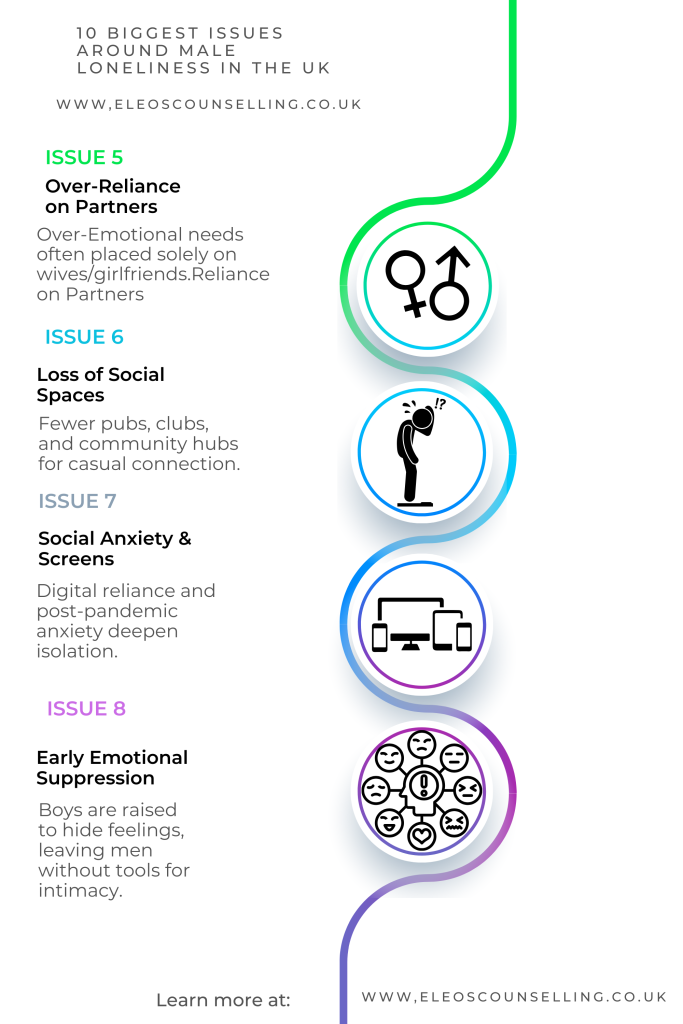
One-to-One Therapy for Male Loneliness
In one-to-one counselling, men have the opportunity to:
-
Explore feelings of isolation without fear of embarrassment.
-
Understand the roots of their loneliness—whether from childhood, relationship breakdowns, or cultural conditioning.
-
Challenge internalised beliefs that vulnerability equals weakness.
-
Develop coping strategies for building healthier, more fulfilling connections.
For many men, this is the first time they feel truly listened to. Talking openly with a therapist can help reframe loneliness, not as a personal failing, but as a common human experience that can be understood and addressed.
Group Therapy and Male Support Groups
Alongside one-to-one therapy, group therapy or male-focused support groups can be incredibly powerful. These settings offer the chance to:
-
Connect with other men who share similar struggles.
-
Break the silence by realising, “I’m not the only one.”
-
Practise vulnerability in a safe environment.
-
Learn from others’ stories and coping strategies.
-
Build new, authentic friendships rooted in shared experience.
Groups such as Andy’s Man Club in the UK have already shown how transformative male support spaces can be. They normalise emotional openness and create a culture where men can speak freely without fear of judgement.
Real Barriers Men Face in Building Friendships
Understanding loneliness means also recognising why it is so hard for men to form and sustain friendships. Several factors contribute:
-
Life transitions – marriage, children, or demanding careers often push friendships to the sidelines.
-
Lack of social spaces – the decline of community clubs, pubs, and third spaces reduces natural meeting points.
-
Reliance on romantic partners – many men place all emotional needs onto a spouse, creating fragility if the relationship struggles.
-
Fear of rejection – without cultural scripts for male vulnerability, reaching out can feel risky.
-
Digital distractions – online interactions often replace real-world connection, leaving men feeling emptier.
Therapy helps address these barriers by giving men the tools to understand their patterns and build healthier social lives.
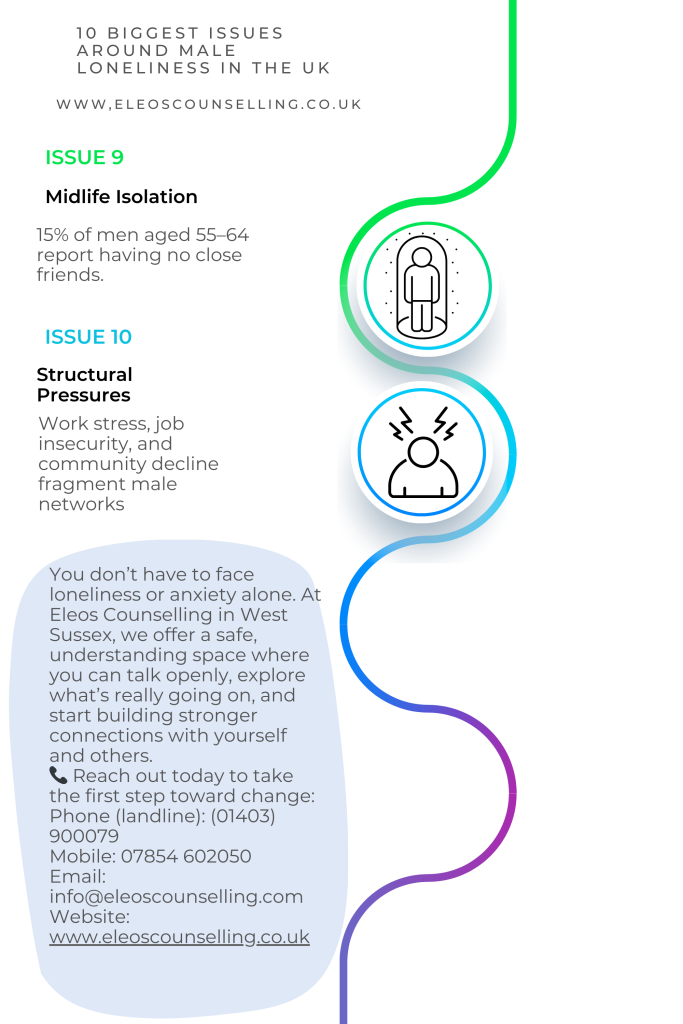
Redefining Masculinity Through Connection
At its core, breaking the cycle of male loneliness requires a cultural shift in how masculinity is defined. Strength should not mean silence. True resilience comes from connection, self-awareness, and the courage to seek help when needed.
Therapy plays a crucial role in this redefinition. It encourages men to embrace qualities like empathy, openness, and compassion—both toward themselves and others. By learning to communicate emotions clearly, men become better equipped to form strong friendships, sustain healthier relationships, and support others.
Practical Ways Men Can Begin to Overcome Loneliness
While therapy provides professional support, there are also everyday steps men can take:
-
Reach out to old friends – even a simple message can reopen a connection.
-
Join local groups or classes – sports teams, walking clubs, or community activities provide natural bonding opportunities.
-
Limit social media reliance – real connections are more nourishing than digital likes.
-
Practise vulnerability – sharing how you feel with one trusted person can ease the burden.
-
Consider therapy – one-to-one or group sessions provide structured, supportive paths forward.
Male Loneliness in Numbers
To highlight the scale of the issue, here are some key statistics:
-
8 million UK men feel lonely at least once a week.
-
Nearly 3 million men feel lonely every day.
-
1 in 4 men report having no close friends.
-
Some studies suggest the rate is as high as 1 in 3.
-
11% of men—rising to 15% in midlife—say they have no close friends.
These numbers are not just abstract data—they represent lives affected by silence, stigma, and missed opportunities for connection.
Breaking the Stigma Together
The good news is that loneliness is not permanent. With the right support, men can begin to reconnect—with themselves, with others, and with life. Therapy provides a safe starting point, offering guidance and encouragement where it is most needed.
At Eleos Counselling, we have seen firsthand how men can flourish when given the space to be honest about their struggles. Whether through individual therapy sessions or group work, the process of speaking out can be profoundly healing.
Conclusion: Choosing Connection Over Silence
Male loneliness is a silent epidemic in the UK. Despite the cultural pressure to appear strong and independent, millions of men live each day without the friendships and support networks that sustain good mental health. The stigma around male vulnerability continues to reinforce the cycle, keeping men isolated and ashamed.
But there is hope. One-to-one therapy provides a confidential space where men can process feelings, challenge unhelpful beliefs, and build coping strategies. Group therapy allows men to share experiences, find solidarity, and realise they are not alone. Together, these approaches help dismantle the stigma and create healthier, more connected lives.
If you or someone you know is struggling with loneliness, taking that first step toward therapy could be life-changing. Reaching out is not weakness—it is courage. It is the decision to move toward a life where silence is replaced with connection, and isolation is replaced with belonging.
Take the First Step
You don’t have to face loneliness or mental health struggles alone. Seeking help is not weakness—it is an act of courage. If you’re ready to talk, Eleos Counselling is here to support you.
Contact Eleos Counselling today:
📞 Landline: 01403 900079
📱 Mobile: 07854 602050
📧 Email: info@eleoscounselling.com
🏡 Address: Eleos Counselling, Little East Street, Billingshurst, RH14 9NP
🌐 Website: www.eleoscounselling.co.uk
Your wellbeing matters. Together, we can work to reduce loneliness and support stronger mental health for men across West Sussex.
Key Men’s Mental Health & Loneliness Support Groups in the UK
1. Andy’s Man Club
Peer-to-peer support groups held weekly across the UK (in person and online). Known for its slogan “It’s okay to talk,”this initiative fosters connection over a brew and a biscuit.
(Wikipedia)
2. Men Who Talk
Free, online support groups for honest, stigma-free conversation. It’s a social—not therapeutic—approach to mental health.
(Men Who Talk)
3. Talk Club
A UK-based charity that frames support as “mental fitness.” Groups check in with each other by asking, “How are you out of 10?”, boosting resilience and wellbeing.
(Talk Club)
4. Mind the Men
Peer support groups for men aged 18+, created in memory of someone lost to suicide. Emphasises safe, non-clinical spaces to talk and be heard.
(mindthemen.co.uk)
5. MenWalkTalk
Community walking groups that combine movement with conversation. Built to reduce isolation and foster male connection through shared activity.
(menwalktalk.co.uk)
6. Platform 1 (Charity, Huddersfield)
Reduces loneliness by offering a meeting space and activities (like bicycle repair) within a repurposed train carriage setting.
(Wikipedia)
7. ManHealth
Runs weekly peer support services in North East England, facilitated by men with lived experience. Offers education, advocacy, and connection.
(ManHealth)
8. Men’s Minds Matter
Suicide intervention and prevention specialists focusing on the male experience. Offers downloadable guides and resources for men in crisis.
(Men’s Minds Matter)
9. Movember Foundation
Provides expert resources and mental health information, focusing on prevention and support for men.
(us.movember.com)
10. Lions Barber Collective
World-wide initiative using barbershops to raise awareness about male mental health and suicide prevention.
(magpiewedding.com)
Additional Developments & Inspiring Initiatives
- Men’s talking circles, such as Men’s Circle and Andy’s Man Club, encourage men to share feelings in a supportive circle. Participants have described it as both therapeutic and relieving.
(The Guardian) - Invested Friends, a grassroots initiative in Devon, uses hands-on activities (DIY, self-defence, wellness sessions) to foster real-world friendships and combat male loneliness.
(thetimes.co.uk) - Tight Lines, a Cornish angling club, brings men together to fish and talk in nature—creating companionship and emotional openness.
(The Guardian)
Summary of Key Groups
| Group Name | Type of Support Offered |
|---|---|
| Andy’s Man Club | Weekly in-person and online peer support |
| Men Who Talk | Free online social peer groups |
| Talk Club | Mental fitness check-ins via weekly talking circles |
| Mind the Men | Suicide-prevention peer support |
| MenWalkTalk | Walk-and-talk support groups |
| Platform 1 | Local community hub reducing loneliness through activities |
| ManHealth | Lived-experience peer support sessions |
| Men’s Minds Matter | Guides and resources for suicidal crisis |
| Movember Foundation | Resource hub focused on male mental health |
| Lions Barber Collective | Awareness via barbershop community spaces |
Why This Matters
These groups provide critical safe spaces for men to share, connect, and support one another—especially as loneliness and isolation continue to drive mental health issues. Peer support groups are often more approachable than formal therapy, helping men take that first step toward opening up.
Tony Larkin FDA,BA (Hons) MBACP (Acc)
I’m Tony Larkin, a qualified psychotherapist and counsellor based in West Sussex. As the founder of Eleos Counselling, I provide a safe, supportive space for people facing challenges such as anxiety, addiction, perfectionism, trauma, and relationship difficulties. With years of experience, I combine professional knowledge with compassion, helping clients find new perspectives, rediscover confidence, and build healthier connections. My approach is rooted in empathy and the belief that lasting change comes through understanding, self-compassion, and support
Stay In Touch
Office
Eleos Counselling Ltd The Workshop, Little East Street, Billingshurst, West Sussex RH14 9NP
Phone Number
(01403)900097

